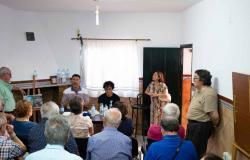The theatrical proposal that he shares with Guadalupe Suárez Jofré passes through the viewer. ‘Fragments of Passion’ is as uncomfortable as it is captivating. Facundo Cersósimo He enjoys his own passion immersed in others that pose very particular obscenities on stage and that are far from what such a word represents in society (Or not?).
Installed in a new staging of this unmissable play, the theater professor also visited ‘Media Hora Entre Questions’. He lent a hand in unraveling such a proposal and also invited memories and experiences of his ties with the theater and with life itself.
-What does ‘Fragment of Passion’ have that makes it so special?
-‘Fragment of passion’ seeks to move the viewer. Move in the sense of mobilizing him from his place, questioning him and putting his civic practice, his mind, his memories, his experience in tension.
-It is a work that has a lot of current events, but is also soaked in tragic stories and Greek mythology.
-Yes, it is sitting there. The work started from reading a text by Ronald Barthes, which is ‘Fragments of a Loving Speech’. He always defines the story around love and bonds and for us it was a starting point that showed us the path to follow. That path had to do with the idea of passion and this in turn is in tragedy. Passions are usually beyond human control. That was what we used and that is why we worked with Oedipus, with Clytemnestra, with Medea, with Agamemnon, who are characters from Greek tragedy.
FRAGMENTS.jpg
-I understand that this is a new staging of a work that you already premiered in San Juan and that has even been performed in other provinces, right?
-Yes, we premiered it last year in April and then we toured Córdoba, the Autonomous City of Buenos Aires (CABA) and Villa Mercedes in San Luis. We have an armed circuit and we earn a subsidy from what was previously the Ministry of Culture of the Nation. It was called MICA and it was precisely to promote tours.
You have to make your way somehow because the works involve a lot of work and run out very quickly. You have to make your way somehow because the works involve a lot of work and run out very quickly.
-And after performing now at Sala TES, are you going to return to Buenos Aires?
-That’s how it is. We are working to return to Buenos Aires because, as the saying goes, ‘God is everywhere, but he serves in Buenos Aires. We understood that a long time ago that we have to make a place for ourselves there and luckily we have been making that recognition. The great art market is there. Here we run out of functions very quickly. People in general are not used to going to the theater, there is no theatrical culture like there is in Buenos Aires. You have to make your way somehow because the works involve a lot of work and run out very quickly. Except for some emblematic works like ‘Luisa’ by Lanotannegra, which must take more than 10 years, the rest is finished quickly and is very frustrating. That’s why we look for other paths, to open up to other markets.
Watch the complete interview with Facundo Cersósimo in Half an Hour Between Questions
Embed – HALF AN HOUR BETWEEN QUESTIONS with FACUNDO CERSOSIMO






